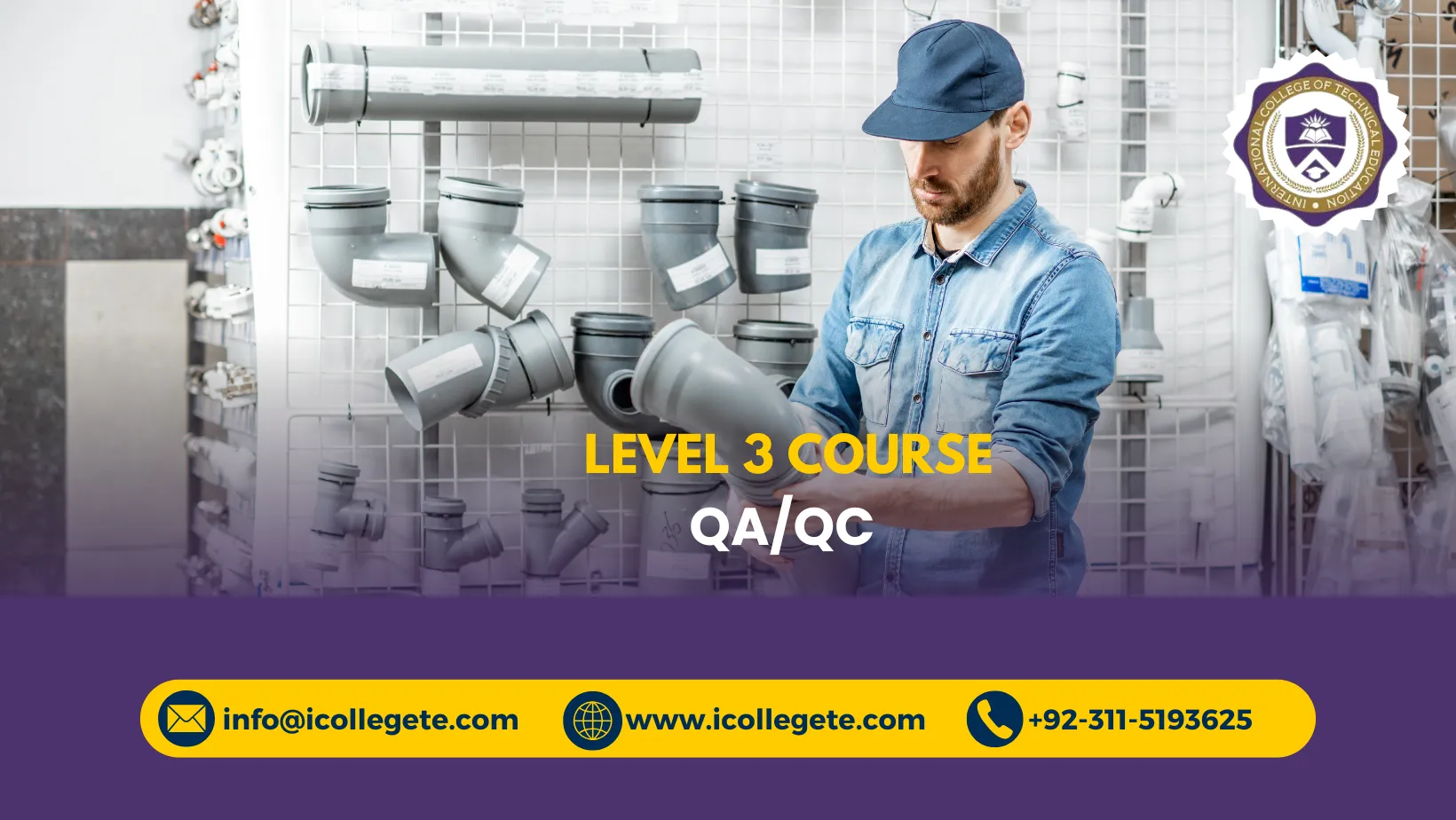In today’s precision-driven industries, quality is not optional—it’s essential. The QA/QC Level 3 Diploma Course in Rawalpindi offers a career-defining opportunity for individuals seeking to build a strong foundation in Quality Assurance (QA) and Quality Control (QC) practices. QA/QC Level 3 Diploma Course in Rawalpindi is ideal for technicians, junior engineers, and fresh graduates who aim to enter the quality management field with confidence and competence.
The QA/QC Level 3 Diploma Course in Rawalpindi introduces learners to the core principles of quality systems, inspection techniques, documentation standards, and compliance protocols. QA/QC Level 3 Diploma Course in Rawalpindi emphasizes practical skills such as interpreting technical drawings, conducting inspections, and maintaining quality records. Participants also gain exposure to industry-relevant standards like ISO 9001, welding inspection basics, and non-destructive testing (NDT) fundamentals.
Delivered by experienced instructors, the program combines theoretical instruction with hands-on learning to ensure real-world applicability. Upon successful completion of QA/QC Level 3 Diploma Course in Rawalpindi, students receive a recognized certification that enhances their employability in sectors such as oil & gas, construction, manufacturing, and engineering services. Whether you’re starting your career or transitioning into a technical quality role, QA/QC Level 3 Diploma Course in Rawalpindi provides the tools and knowledge to meet industry expectations and grow professionally in competitive environments.
Course Overview
The QA/QC Level 3 Diploma Course in Rawalpindi is a professional entry-level qualification structured into six focused study units. QA/QC Level 3 Diploma Course in Rawalpindi is designed to build foundational expertise in quality systems, inspection methods, and compliance procedures.
The six study units include: Introduction to Quality Assurance and Quality Control, Basics of Quality Management Systems (QMS), Engineering Drawing Interpretation, Inspection and Testing Techniques, Documentation and Reporting Standards, and Fundamentals of Non-Destructive Testing (NDT). Each unit is tailored to provide practical, job-ready skills that align with industry requirements and regulatory expectations.
QA/QC Level 3 Diploma Course in Rawalpindi is particularly suitable for individuals entering the workforce or transitioning into technical roles within quality departments. QA/QC Level 3 Diploma Course in Rawalpindi supports early career development by equipping learners with the ability to understand inspection protocols, maintain quality records, and contribute to compliance efforts. The curriculum also introduces learners to the importance of quality in project execution, product reliability, and customer satisfaction.
By completing QA/QC Level 3 Diploma Course in Rawalpindi, participants will be prepared to take on junior QA/QC roles, assist in audits, and support quality teams in engineering, construction, and manufacturing environments. The structured content and practical orientation of the QA/QC Level 3 Diploma make it an ideal starting point for those aiming to build a long-term career in quality management and industrial compliance.
Course Study Units
- Introduction to Quality Assurance and Quality Control
- Fundamentals of Quality Management Systems (QMS)
- Engineering Drawing Interpretation and Technical Standards
- Inspection and Testing Techniques in Industrial Settings
- Documentation, Reporting, and Recordkeeping Procedures
- Basics of Non-Destructive Testing (NDT) and Visual Inspection
Learning Outcomes for this course
Understanding QA/QC Fundamentals
- Define the roles and responsibilities of QA and QC in industrial environments
- Recognize the importance of quality in engineering and manufacturing processes
- Identify key components of quality systems and their applications
- Understand the relationship between quality control and customer satisfaction
- Apply basic quality principles to routine inspection tasks
- Support quality initiatives within technical teams
- Promote awareness of quality standards in workplace settings
Applying Quality Management Systems
- Understand the structure and purpose of QMS frameworks
- Learn the basics of ISO 9001 and related standards
- Monitor quality objectives and performance indicators
- Support implementation of quality procedures in operations
- Assist in maintaining compliance with documented protocols
- Participate in internal quality reviews and evaluations
- Contribute to continuous improvement efforts
Interpreting Engineering Drawings
- Read and understand technical drawings and specifications
- Identify symbols, tolerances, and measurement standards
- Apply drawing interpretation to inspection and testing tasks
- Support quality checks based on design requirements
- Communicate technical information effectively with teams
- Detect discrepancies between drawings and actual components
- Improve accuracy in inspection through drawing analysis
Conducting Basic Inspection and Testing
- Perform visual and dimensional inspections using standard tools
- Understand basic testing methods for materials and components
- Record inspection results and identify deviations
- Apply safety protocols during inspection activities
- Support quality verification in production and assembly lines
- Collaborate with supervisors to resolve inspection issues
- Enhance product reliability through structured testing
Managing Documentation and Reporting
- Maintain accurate records of inspections and quality checks
- Prepare basic quality reports for internal use
- Organize documentation for traceability and compliance
- Support audit readiness through proper recordkeeping
- Communicate findings clearly in written formats
- Assist in updating quality manuals and procedures
- Promote transparency in quality operations
Introducing Non-Destructive Testing (NDT)
- Understand the principles of NDT and its industrial relevance
- Learn basic NDT methods such as visual, magnetic, and ultrasonic testing
- Identify suitable NDT techniques for different materials
- Support safety and reliability through non-invasive testing
- Record and interpret NDT results under supervision
- Assist in selecting appropriate NDT tools and procedures
- Contribute to structural integrity assessments in engineering projects
Entry Requirements for this course
- Age Requirement Applicants must be at least 18 years old. This ensures they possess the maturity and responsibility needed to engage with technical quality control concepts and workplace expectations.
- Educational Qualification Candidates should have completed at least Matric (10th grade) or equivalent. A background in science or technical subjects is preferred to support understanding of engineering drawings and inspection procedures.
- Work Experience No prior experience is required, but individuals with basic exposure to industrial environments, workshops, or technical training will benefit from the course’s practical orientation.
- Language Proficiency Participants must be able to read and understand Urdu or English. This is essential for interpreting course materials, technical documents, and quality standards used during training.
- Technical Aptitude Applicants should have a basic understanding of tools, measurements, and safety practices. Familiarity with mechanical or electrical components will help in grasping inspection techniques.
- Professional Attitude Candidates must demonstrate a willingness to learn, follow structured procedures, and maintain accuracy in documentation. A detail-oriented mindset is important for success in QA/QC roles.
- Documentation Requirements Enrollment requires a valid CNIC or passport and two recent passport-sized photographs. These documents are necessary for registration, certification, and recordkeeping.
- Career Intent This course is ideal for individuals aiming to start a career in quality assurance, inspection, or technical supervision. A clear interest in industrial standards and compliance will enhance learning outcomes.
Course Benefits of this course
Strong Foundation in Quality Assurance and Control
- Understand the core principles of QA and QC in industrial settings
- Learn how quality impacts safety, performance, and customer satisfaction
- Gain clarity on roles and responsibilities in quality departments
- Build awareness of compliance and regulatory expectations
- Develop a structured approach to inspection and documentation
- Support quality initiatives in engineering and manufacturing environments
- Improve accuracy and consistency in technical tasks
- Prepare for entry-level roles in quality control and supervision
- Build confidence in applying quality standards
Practical Skills for Industrial Application
- Learn to interpret engineering drawings and technical specifications
- Perform basic inspections using standard tools and techniques
- Record and report inspection results accurately
- Understand material testing and visual inspection methods
- Apply safety protocols during inspection activities
- Support production teams with quality verification
- Detect and report non-conformities in components and processes
- Assist in maintaining product reliability and consistency
- Gain hands-on experience through practical training
Career Entry and Job Readiness
- Qualify for junior QA/QC roles in engineering and construction sectors
- Enhance employability with a recognized technical diploma
- Build a professional profile for industrial recruitment
- Prepare for roles in inspection, documentation, and compliance
- Support career transitions into technical quality fields
- Gain industry-relevant skills for immediate job application
- Improve readiness for site-based and workshop roles
- Open doors to further specialization and certification
- Strengthen your resume with practical competencies
Compliance and Documentation Awareness
- Learn the basics of quality documentation and reporting standards
- Understand how to maintain traceable inspection records
- Support audit readiness through proper recordkeeping
- Communicate findings clearly in written formats
- Assist in updating quality manuals and procedures
- Promote transparency in quality operations
- Align documentation with client and regulatory expectations
- Reduce errors through structured reporting practices
- Build habits of accountability and precision
Exposure to Industry Standards and Tools
- Get introduced to ISO 9001 and other global quality frameworks
- Learn about common inspection tools and their applications
- Understand calibration and measurement accuracy
- Explore basic non-destructive testing (NDT) techniques
- Familiarize with sector-specific quality protocols
- Apply standards to real-world industrial scenarios
- Support compliance with client specifications
- Gain insight into quality benchmarks across industries
- Build adaptability for diverse technical environments
Professional Development and Growth Potential
- Develop discipline and attention to detail in technical work
- Build teamwork and communication skills in quality settings
- Learn to follow structured procedures and protocols
- Improve problem-solving through quality analysis
- Gain confidence in handling inspection responsibilities
- Support continuous improvement in workplace practices
- Prepare for supervisory roles with foundational knowledge
- Build a mindset of responsibility and precision
- Position yourself for long-term career growth
Versatility Across Industrial Sectors
- Apply QA/QC skills in construction, manufacturing, and engineering services
- Support quality operations in oil & gas, textiles, and automotive industries
- Adapt inspection techniques to different materials and environments
- Contribute to safety and reliability in diverse projects
- Assist in quality control for mechanical, electrical, and civil components
- Work in site-based, workshop, or production line settings
- Align with industry-specific standards and expectations
- Support cross-functional teams with quality input
- Build flexibility for multi-sector employment
Certification and Recognition
- Receive a UK-regulated diploma recognized by employers
- Validate your skills with a formal qualification
- Enhance credibility in technical and industrial roles
- Support applications for further QA/QC certifications
- Build trust with clients and supervisors
- Demonstrate commitment to quality and compliance
- Strengthen your professional identity in the field
- Improve visibility in competitive job markets
- Gain a credential that supports career advancement
Who Should Enroll in this course
- Fresh Engineering Graduates Individuals who have recently completed diplomas or degrees in mechanical, civil, electrical, or industrial engineering and want to specialize in quality control.
- Technical Vocational Students Learners from technical institutes who have studied fabrication, welding, or industrial technology and seek QA/QC certification for job readiness.
- Junior Technicians and Site Assistants Entry-level professionals working in construction, manufacturing, or engineering sites who want to formalize their skills and advance in quality roles.
- Workshop Supervisors Individuals managing small teams in mechanical or electrical workshops who need structured training in inspection and documentation.
- Production Line Operators Staff involved in assembly or manufacturing processes who want to understand quality standards and improve product consistency.
- Civil Works Inspectors (Entry-Level) Professionals inspecting concrete, steel, or structural components who need foundational QA/QC knowledge to support site compliance.
- Maintenance Technicians Those responsible for equipment upkeep who want to integrate quality checks into preventive maintenance routines.
- Fabricators and Welders Skilled workers in metalwork and welding who want to learn inspection techniques and quality documentation relevant to their trade.
- Electrical Installers and Fitters Technicians installing electrical systems who need to understand quality protocols and testing procedures.
- Safety and Compliance Assistants Individuals supporting workplace safety who want to expand their role into quality assurance and inspection.
- Construction Helpers and Labor Supervisors On-site personnel who want to transition into technical QA/QC roles with formal certification.
- Oil & Gas Field Workers (Entry-Level) Staff working in pipeline, rig, or refinery environments who need basic QA/QC training for operational safety and compliance.
- Textile and Garment Quality Checkers Individuals inspecting fabrics or finished garments who want to improve accuracy and reporting in quality control.
- Automotive Assembly Workers Professionals involved in vehicle production who want to understand inspection standards and defect identification.
- Pharmaceutical Packaging Staff Workers handling product packaging who need to ensure compliance with hygiene and quality protocols.
- Logistics and Warehouse Assistants Personnel managing inventory and shipments who want to apply quality checks during storage and dispatch.
- Technical Sales Support Staff Individuals assisting in product demonstrations or client support who benefit from understanding quality specifications.
- Quality Control Interns Students or trainees placed in QA/QC departments who need structured learning to support their practical experience.
- Small Business Owners in Manufacturing Entrepreneurs running fabrication or production units who want to implement basic quality systems and improve product reliability.
- Anyone Seeking Entry into QA/QC Careers Career changers or job seekers aiming to enter the quality assurance field with a recognized qualification and practical skills.
Future Progression of this course
QA/QC Level 6 Diploma
- Advance to a higher-level qualification focused on strategic quality management
- Learn to lead audits, manage compliance systems, and supervise inspection teams
- Deepen understanding of ISO standards and global quality frameworks
- Prepare for senior roles in engineering, construction, and manufacturing sectors
- Gain expertise in documentation, corrective actions, and performance monitoring
- Build leadership capacity in quality assurance departments
- Strengthen your professional profile for international opportunities
ISO 9001 Internal Auditor Training
- Learn to conduct internal audits aligned with ISO 9001 standards
- Understand audit planning, execution, and reporting procedures
- Identify non-conformities and recommend corrective actions
- Support organizations in maintaining certification readiness
- Improve documentation and traceability systems
- Qualify for roles in compliance and audit support
- Enhance credibility in regulatory and quality assurance roles
Non-Destructive Testing (NDT) Level I Certification
- Begin specialization in NDT techniques for industrial inspection
- Learn visual, magnetic particle, and ultrasonic testing basics
- Apply NDT methods in construction, oil & gas, and manufacturing
- Support safety and reliability through non-invasive testing
- Record and interpret basic NDT results
- Assist in structural integrity assessments
- Build technical expertise for advanced NDT roles
Welding Inspection Certification
- Gain knowledge of welding standards and inspection protocols
- Learn to identify weld defects and evaluate workmanship
- Support quality control in fabrication and construction projects
- Understand welding symbols and technical drawings
- Prepare for roles in welding supervision and QA/QC support
- Improve safety and compliance in welding operations
- Build a career in structural and pipeline inspection
Technical Report Writing and Documentation Skills
- Learn to prepare structured inspection and quality reports
- Improve clarity and accuracy in technical communication
- Support audit readiness through organized recordkeeping
- Train in documentation protocols and traceability
- Align reporting with client and regulatory expectations
- Qualify for roles in quality documentation and compliance support
- Strengthen internal communication and decision-making
Quality Control in Specialized Sectors
- Apply QA/QC principles in textiles, food processing, or pharmaceuticals
- Learn sector-specific standards and inspection protocols
- Monitor hygiene, safety, and product consistency
- Support regulatory compliance and certification processes
- Train staff in quality awareness and operational standards
- Qualify for roles in sector-based quality supervision
- Expand career options across diverse industrial domains
Site-Based QA/QC Supervision Roles
- Transition into supervisory roles on construction or engineering sites
- Manage inspection teams and coordinate quality activities
- Monitor compliance with project specifications and safety standards
- Support client reporting and documentation
- Lead quality briefings and team training sessions
- Improve site performance through structured QA/QC systems
- Build leadership experience in field-based environments
Quality Assurance Assistant or Coordinator Roles
- Qualify for office-based roles supporting QA/QC departments
- Assist in managing quality records and compliance reports
- Coordinate with production and inspection teams
- Support internal audits and certification processes
- Communicate with clients and regulatory bodies
- Contribute to continuous improvement initiatives
- Build administrative and technical experience in quality management
Conclusion
The QA/QC Level 3 Diploma Course in Rawalpindi offers more than technical instruction—it delivers a mindset shift toward precision, accountability, and structured thinking. For individuals entering the industrial workforce, this program builds the habits and awareness needed to contribute meaningfully to quality-driven environments.
What makes this course distinct is its emphasis on readiness. It prepares learners not just to follow procedures, but to understand why they matter. Participants develop the ability to spot inconsistencies, support compliance, and communicate findings with clarity—skills that are essential in any sector where safety, reliability, and performance are non-negotiable.
This diploma is a launchpad for those who want to grow into roles that demand attention to detail and a commitment to standards. It encourages learners to take ownership of their work, ask the right questions, and build confidence in their technical judgment. Whether you’re working on-site, in a workshop, or supporting documentation teams, the course equips you to be a dependable part of any quality system.
In a world where quality defines reputation and opportunity, this qualification helps you stand out as someone who understands the value of doing things right—from the start.






